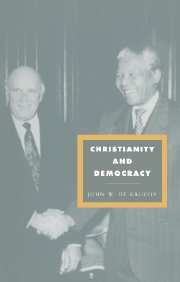Book contents
- Frontmatter
- Contents
- General editors' preface
- Acknowledgements
- Introduction
- PART I THE SYSTEM AND THE VISION
- PART II HISTORICAL AND THEOLOGICAL CONNECTIONS
- PART III CHURCHES AND THE STRUGGLE FOR DEMOCRACY
- PART IV CRITICAL THEOLOGICAL REFLECTION
- 8 A Theology for a just democratic world order
- Select bibliography
- Index of names
- Index of subjects
- Cambridge Studies in Ideology and Religion
8 - A Theology for a just democratic world order
Published online by Cambridge University Press: 21 January 2010
- Frontmatter
- Contents
- General editors' preface
- Acknowledgements
- Introduction
- PART I THE SYSTEM AND THE VISION
- PART II HISTORICAL AND THEOLOGICAL CONNECTIONS
- PART III CHURCHES AND THE STRUGGLE FOR DEMOCRACY
- PART IV CRITICAL THEOLOGICAL REFLECTION
- 8 A Theology for a just democratic world order
- Select bibliography
- Index of names
- Index of subjects
- Cambridge Studies in Ideology and Religion
Summary
The Enlightenment, it has been said, ‘was the original liberation movement’ of the modern age. Spawning the American and French Revolutions, it ushered in a new world order in which the people governed, set free from the hierarchies of the past. In the New World, the new order was distinctly Protestant, liberal, and capitalist. In the Old World it was predominantly secular, and, in some respects, more socialist in orientation. Hence the definition of modernity as that historical project, linked to both capitalism and socialism, which has made democracy its chosen polity, the nation-state its form of political sovereignty, and the bourgeoisie its creative vanguard.
The Russian Revolution in 1917, also a product of modernity, was an attempt to break the hegemony of the bourgeoisie and institute a new world truly governed by the people without any distinction of class. Marxist-Leninism was, however, a detour in the development of democracy, not its fulfilment. In the end, the Party not the people ruled with totalitarian thoroughness. Hence the contemporary claim that the collapse of Communism has heralded the victory not only of democracy, but more specifically of liberal democratic capitalism. According to Fukuyama, modernity is back on track; Hegel's prediction that the emancipatory promise of the Enlightenment and the French Revolution would be fulfilled has come true. From a different perspective some would argue that we are now already at the end of project-modernity, and are searching for ways to understand what it means to be postmodern.
Whether we regard the present time in the cultural history of the world as the dying moments of modernity, or the birth of post-modernity is unimportant.
- Type
- Chapter
- Information
- Christianity and DemocracyA Theology for a Just World Order, pp. 227 - 278Publisher: Cambridge University PressPrint publication year: 1995



